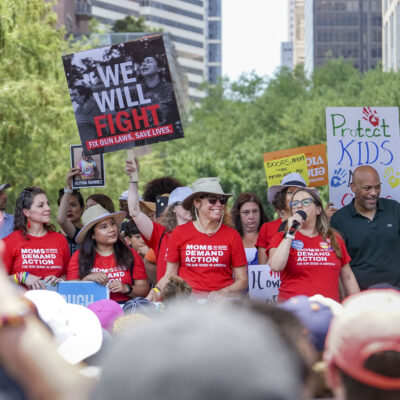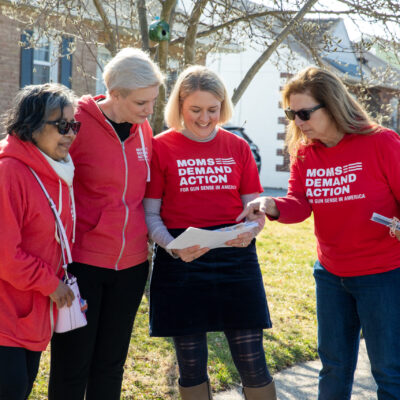Disarm Hate
What does it solve?
Guns and hate are a fatal combination. In an average year, more than 25,000 hate crimes in the United States involve a firearm—more than 69 each day.1Everytown Research analysis of the National Crime Victimization Survey (NCVS). A yearly average was developed using 12 years of the most recently available data: 2010 to 2021. In parts of the US, some people convicted of hate crimes can still legally buy and have guns. Congress and state legislatures must pass laws that keep guns out of the hands of those who have been convicted of hate crimes.
The work to prevent hate-motivated violence must include stronger gun laws, like the Disarm Hate Act, which closes a dangerous loophole in federal law by prohibiting people convicted of violent or threatening hate crimes from having a gun. States should also act to stop people convicted of hate crimes from buying or having a gun. In addition, Extreme Risk laws can help prevent access to guns by people who have shown serious warning signs that they are a threat to others, including those who are motivated by bias.
Hate Crime Prohibitor
Which states prohibit people with hate crime convictions from having firearms?
Alabama has not adopted this policy
Alaska has not adopted this policy
Arizona has not adopted this policy
Arkansas has not adopted this policy
California has adopted this policy
Colorado has adopted this policy
Connecticut has adopted this policy
Delaware has adopted this policy
Florida has adopted this policy
Georgia has not adopted this policy
Hawaii has adopted this policy
Idaho has adopted this policy
Illinois has adopted this policy
Indiana has not adopted this policy
Iowa has not adopted this policy
Kansas has not adopted this policy
Kentucky has not adopted this policy
Louisiana has not adopted this policy
Maine has not adopted this policy
Maryland has adopted this policy
Massachusetts has adopted this policy
Michigan has adopted this policy
Minnesota has adopted this policy
Mississippi has not adopted this policy
Missouri has adopted this policy
Montana has adopted this policy
Nebraska has adopted this policy
Nevada has not adopted this policy
New Hampshire has adopted this policy
New Jersey has adopted this policy
New Mexico has not adopted this policy
New York has adopted this policy
North Carolina has not adopted this policy
North Dakota has not adopted this policy
Ohio has not adopted this policy
Oklahoma has not adopted this policy
Oregon has not adopted this policy
Pennsylvania has adopted this policy
Rhode Island has not adopted this policy
South Carolina has not adopted this policy
South Dakota has adopted this policy
Tennessee has adopted this policy
Texas has not adopted this policy
Utah has not adopted this policy
Vermont has not adopted this policy
Virginia has adopted this policy
Washington has adopted this policy
West Virginia has adopted this policy
Wisconsin has adopted this policy
Wyoming has not adopted this policy
How it works
People convicted of a hate crime shouldn’t have guns.
The vast majority of reported hate crimes are directed against communities of color, religious minorities, and LGBTQ+ people.1Federal Bureau of Investigation, “Crime Data Explorer: Hate Crime in the United States,” accessed January 13, 2022, https://bit.ly/3Gsb3v1. These hate crimes can become deadly when firearms are involved. Easy access to firearms gives a hate-filled individual the opportunity to shatter numerous lives and whole communities, as evidenced by the June 2015 shooting at the Emanuel African Methodist Episcopal Church in Charleston, SC, when a white supremacist opened fire in a church, killing nine Black worshippers;2Jason Horowitz, Nick Corasaniti, and Ashley Southall, “Nine Killed in Shooting at Black Church in Charleston,” New York Times, June 17, 2015, https://nyti.ms/2uGcqDb. the October 2018 shooting at the Tree of Life Synagogue in Pittsburg, PA, when a white nationalist killed 11 worshippers and wounded six more;3Campbell Robertson, Christopher Mele, and Sabrina Tavernise, “11 Killed in Synagogue Massacre; Suspect Charged With 29 Counts,” New York Times, October 27, 2018, https://www.nytimes.com/2018/10/27/us/active-shooter-pittsburgh-synagogue-shooting.html. the May 2022 shooting at Tops Friendly Market in Buffalo, NY, when another white supremacist killed 10 Black people and wounded three more,4Mary B. Pasciak, “Tops Markets Shooter Chose AR-15 to Stoke Controversy,” Buffalo News, July 14, 2022, https://bit.ly/3PNO9DC; Craig Whitlock, David Willman, and Alex Horton, “Massacre Suspect Said He Modified Bushmaster Rifle to Hold More Ammunition,“ Washington Post, May 15, 2022, https://wapo.st/3SkEe8N. and the November 2022 shooting at Club Q, a LGBTQ+ nightclub in Colorado Springs, CO, when a gunman shot at least 22 people, five fatally, many of whom identified as LGBTQ+.5Colorado Springs Police Department, “Update to Shooting at Club Q – Victim Update,” November 28, 2022, https://bit.ly/3WfKP7u; Debbie Kelley, “5 Victims in Club Q Mass Shooting Identified, as Mourning Continues Around Colorado Springs,” The Gazette, January 24, 2023, https://bit.ly/3MP058B.
Current federal and state gun laws do not adequately address the problem. While all felonies prohibit gun possession under federal law, most misdemeanors, including hate crime misdemeanors, do not—even though hate crimes involving firearms were the catalyst for hate crime laws in the United States. Hate crime misdemeanors can be serious, violent acts, but under federal law, a violent or threatening hate crime misdemeanor conviction does not prohibit gun possession. While some states and Washington, DC, have laws closing this gap, many states have not taken action. This means that in parts of the country a person convicted of a violent hate crime could legally pass a background check and buy a gun.
By the numbers
25k+
In an average year, more than 25,000 hate crimes in the US involve a firearm—69 a day.
60%
60 percent of violent hate crime victimizations from 2015 to 2019 were believed to be motivated by bias against race, ethnicity, or national origin.
20%





